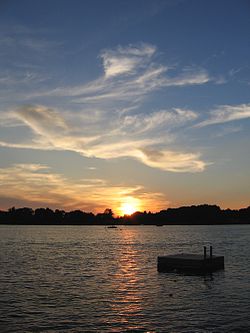Copake, New York
| Copake, New York | |
|---|---|
| Town | |

Sunset over Copake Lake
|
|
 Location of Copake, New York |
|
| Coordinates: 42°8′2″N 73°34′6″W / 42.13389°N 73.56833°W | |
| Country | United States |
| State | New York |
| County | Columbia |
| Government | |
| • Type | Town Council |
| • Town Supervisor | Reginald Crowley (R) |
| • Town Council |
Members' List
|
| Area | |
| • Total | 42.0 sq mi (108.9 km2) |
| • Land | 40.8 sq mi (105.6 km2) |
| • Water | 1.3 sq mi (3.3 km2) |
| Elevation | 568 ft (173 m) |
| Population (2010) | |
| • Total | 3,615 |
| • Density | 89/sq mi (34.2/km2) |
| Time zone | Eastern (EST) (UTC-5) |
| • Summer (DST) | EDT (UTC-4) |
| ZIP codes | 12516, 12593 |
| Area code(s) | 518 |
| FIPS code | 36-18102 |
| GNIS feature ID | 0978865 |
| Website | townofcopake |
Copake is a town in Columbia County, New York, United States. The population was 3,615 at the 2010 census. The town derives its name from a lake, which was known to the natives as Cook-pake, or Ack-kook-peek, meaning "Snake Pond".
Copake is on the eastern border of the county. Taconic State Park is along the eastern edge of the town.
Copake was part of the 1686 Taconic Grant to Robert Livingston for about 400 acres (1.6 km2) of good land and 2,200 acres (8.9 km2) of woodland. After it was purchased from the Indians it turned out to be 160,000 acres (650 km2), and he established the English-style Livingston Manor. The manor extended well into what is now Massachusetts. The first lease given by Livingston in Copake was for about 85 acres (340,000 m2) in 1687 to Matthews Abraham Van Deusen. Because New England claimed ownership west to the Hudson River, a border dispute broke out. The Massachusetts Bay Colony laid out three townships west of the Taconic Mountains in 1755. Most of the present town of Copake was in one of the townships. New settlers were given 100 acres (0.40 km2) free, and some of Livingston's tenants refused to pay rent. The border was settled in 1757 by the Lords Commissioners of Trade in London. Farmers west of the border continued to protest, however. In 1844 a rally organized by the Taconic Mutual Association took place in the center of the hamlet. After the rally the arrest of several of the leaders sparked wider protests. Eventually the Anti-Rent Party was formed in New York state, and New York instituted land reform. The Anti-Rent Party called for a Homestead Act to develop the western land. It became part of the Republican Party platform and was important in the election of Abraham Lincoln in 1860.
The town of Copake was formed in 1824 by splitting it from the town of Granger that was renamed Taghkanic. An early industry was iron mining and smelting. In Taconic State Park adjacent to Copake Falls is the "Ore Pit", a former iron mine, now a 40-foot (12 m) deep swimming pond.
...
Wikipedia
